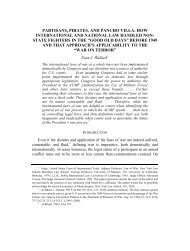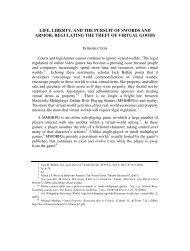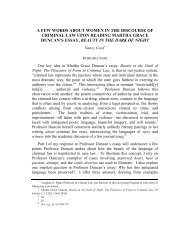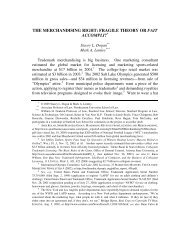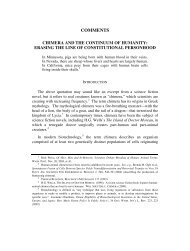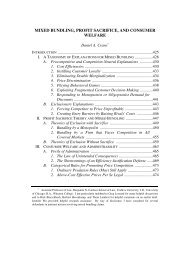The Hidden Influence of Jewish Law on the - Emory University ...
The Hidden Influence of Jewish Law on the - Emory University ...
The Hidden Influence of Jewish Law on the - Emory University ...
Create successful ePaper yourself
Turn your PDF publications into a flip-book with our unique Google optimized e-Paper software.
1406 EMORY LAW JOURNAL [Vol. 57<br />
<str<strong>on</strong>g>The</str<strong>on</strong>g> bailee’s involvement in attending to a lost object exempts him from<br />
attending to <strong>the</strong> poor man (which would o<strong>the</strong>rwise be obligatory), <strong>the</strong>reby<br />
allowing <strong>the</strong> returner <str<strong>on</strong>g>of</str<strong>on</strong>g> lost property to derive a clear financial benefit from<br />
his acti<strong>on</strong>; such a benefit qualifies as a payment. This financial benefit,<br />
according to Rabbi Joseph, is itself sufficient to classify <strong>the</strong> finder <str<strong>on</strong>g>of</str<strong>on</strong>g> lost<br />
property as a bailee-for-hire, since he can derive financial benefit from his<br />
bailment. 13 This outcome is unlikely, however, and that is why some<br />
authorities accept <strong>the</strong> opini<strong>on</strong> <str<strong>on</strong>g>of</str<strong>on</strong>g> Rabbah and rule that, since <strong>the</strong> financial gain<br />
is sufficiently remote, a finder should better be classified as a gratuitous bailee.<br />
As a matter <str<strong>on</strong>g>of</str<strong>on</strong>g> <str<strong>on</strong>g>Jewish</str<strong>on</strong>g> law, with its almost unique mixture <str<strong>on</strong>g>of</str<strong>on</strong>g> law and religi<strong>on</strong>,<br />
this dispute makes sense. But it does not easily map <strong>on</strong>to native comm<strong>on</strong> law<br />
principles.<br />
<str<strong>on</strong>g>The</str<strong>on</strong>g> Comm<strong>on</strong> <str<strong>on</strong>g>Law</str<strong>on</strong>g> Traditi<strong>on</strong><br />
This exact dispute as to <strong>the</strong> status <str<strong>on</strong>g>of</str<strong>on</strong>g> <strong>the</strong> finder <str<strong>on</strong>g>of</str<strong>on</strong>g> lost property occurs in <strong>the</strong><br />
comm<strong>on</strong> law. As <strong>on</strong>e legal encyclopedia states:<br />
<str<strong>on</strong>g>The</str<strong>on</strong>g> finder <str<strong>on</strong>g>of</str<strong>on</strong>g> lost property who takes possessi<strong>on</strong> <str<strong>on</strong>g>of</str<strong>on</strong>g> it assumes <strong>the</strong><br />
duties <str<strong>on</strong>g>of</str<strong>on</strong>g> a bailee without compensati<strong>on</strong>, although <strong>the</strong>re is also<br />
authority that <strong>the</strong> finder is a bailee for hire. 14<br />
However, in comm<strong>on</strong> law <strong>the</strong> prevailing view is that <strong>the</strong> finder is a gratuitous<br />
bailee, with <strong>on</strong>ly a minority <str<strong>on</strong>g>of</str<strong>on</strong>g> authorities accepting <strong>the</strong> bailee for hire rule. 15<br />
But this dispute makes no sense in <strong>the</strong> comm<strong>on</strong> law. Unlike <str<strong>on</strong>g>Jewish</str<strong>on</strong>g> law, which<br />
mandates that <strong>on</strong>e pick <str<strong>on</strong>g>of</str<strong>on</strong>g> a lost object when <strong>on</strong>e sees it, and unlike <str<strong>on</strong>g>Jewish</str<strong>on</strong>g> law<br />
which mandates <strong>the</strong> giving <str<strong>on</strong>g>of</str<strong>on</strong>g> charity in certain situati<strong>on</strong>s, <strong>the</strong> comm<strong>on</strong> law has<br />
no basis for explaining why <strong>on</strong>e might c<strong>on</strong>sider <strong>the</strong> pers<strong>on</strong> who picks up a lost<br />
object to be a bailee for hire. Indeed, when <strong>on</strong>e looks in <strong>the</strong> classical works <str<strong>on</strong>g>of</str<strong>on</strong>g><br />
<strong>the</strong> historic comm<strong>on</strong> law, <strong>on</strong>e sees that <strong>the</strong> commentators <strong>on</strong> <strong>the</strong> comm<strong>on</strong> law<br />
fundamentally is not a bailee at all as every<strong>on</strong>e is required to exercise this minimum level <str<strong>on</strong>g>of</str<strong>on</strong>g> care for o<strong>the</strong>rs’<br />
property). Rabbah would disagree with this as well, viewing <strong>the</strong> property in <strong>the</strong> finder’s possessi<strong>on</strong> as no<br />
different from an object left <strong>on</strong> any<strong>on</strong>e’s property by a stranger (heftsekha bimekomi), due no (extraordinary)<br />
care o<strong>the</strong>r than <strong>the</strong> avoidance <str<strong>on</strong>g>of</str<strong>on</strong>g> negligence.<br />
13 This distant definiti<strong>on</strong> <str<strong>on</strong>g>of</str<strong>on</strong>g> benefit is not foreign to American law. Frequently, <strong>the</strong> law defines even a very<br />
tangential <strong>the</strong>oretical benefit as sufficient to be classified as a benefit as a matter <str<strong>on</strong>g>of</str<strong>on</strong>g> law. See, e.g., D<strong>on</strong>ovan v.<br />
Bierwirth, 680 F.2d 263 (2d Cir. 1982) (holding that, for <strong>the</strong> purposes ERISA law, a benefit encompasses even<br />
situati<strong>on</strong>s where <strong>the</strong>re is no apparent real financial benefit).<br />
14 36A C.J.S. Finding Lost Goods § 8 & nn.13–15 (2008) (emphasis added, footnotes omitted).<br />
15 See, e.g., RAY ANDREWS BROWN & WALTER R. RAUSHENBUSH, THE LAW OF PERSONAL PROPERTY § 3.5<br />
(3d ed. 1975); 36A C.J.S. Finding Lost Goods § 8 (2008).




